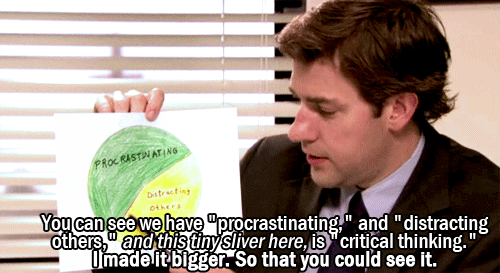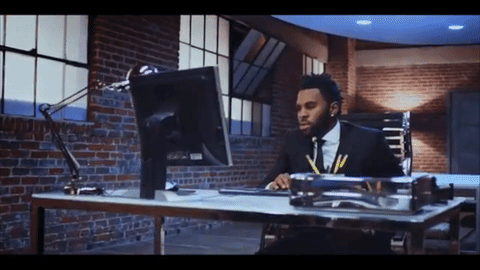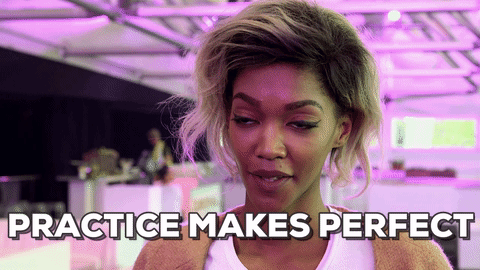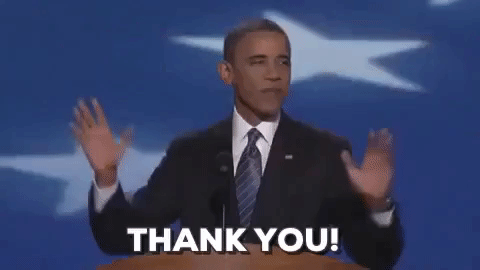You filled out your application, submitted your resume, and congrats—Mr. or Ms. Potential Future Employer has reached out to you to set up a Skype interview. Your stomach seizes and your brow furrows. A Skype interview? Video interviews seem scary and intimidating, but here’s the good news: You can still make a good impression online without the killer handshake to seal the deal. “How can my irresistible charm work its magic hidden behind a computer screen?” you wonder. Fortunately, there are many ways to still stand out to your virtual interviewer.
“The main difference is there’s basically not a difference,” Temple University career coach Karen Demmler said. “That’s why a lot of the employers are using Skype. They can really get an idea of what type of candidate they want through the experience through Skype. That’s why it’s becoming so popular.”
Make sure your video is working—it’s time to master the Skype interview.
1. Be Prepared and On Time

Being ready to go on time earns you major points. It shows potential employers you’re reliable and can meet deadlines. “The trouble is setting up the call,” University of Maine freshman Darian Goggin said. “When you have to add someone first before calling them means you have to do some prep work before hosting the actual interview.” Sit down with Skype open five minutes before the interview starts.
Have your notes organized and paper ready in case you want to jot something down during the interview. “You still have to do the same amount of research, because a lot of the time these interviews go more in depth than a typical phone screening interview,” Demmler said. “Make sure you go on LinkedIn, look at their Twitter, their social media, their website. The difference with that is you can have cheat sheets. You can have those things on the side knowing the quick facts about a company or things you want to refer to.”
2. Anticipate Problems and Have a Backup Plan

Before the Skype call, double-check your Internet connection. If something does go wrong, though, don’t panic. Handle the situation with grace. Have your phone nearby in case things go south (just check the ringer and vibrator are off) so you can seamlessly resume the interview with your phone’s Skype app or ask to switch to a phone call. Practice Skyping on your phone beforehand in case of this scenario to perfect the angle and make sure everything showing in the background is still interview appropriate. Your problem-solving skills and ability to remain calm under pressure will definitely shine through.
“Everyone knows that technology’s not perfect and there’s always going to be mishaps,” Temple University Assistant Director of Internships and Experiential Education Sammy Munsch said. “Instead of freaking out just say, ‘Oh, I can’t see you. Do you mind if I call you right back?’ or maybe if it continues to happen, ‘This seems to not be working, can we move it to the phone?’ That way you can continue your interview. It shows that you’re handling an issue well and under stress because everybody knows that interviews are kind of stressful.”
3. Eliminate Distractions

The last thing the Director of Internship Coordination at your dream job wants to hear is your cat scratching at your bedroom door or your roommates pre-gaming for the football game. Send a group text to your roomies letting them know when you’ll be doing a Skype interview ahead of time. Give yourself some wiggle room on each end of the time frame to be safe. If the interview is scheduled from noon to 12:30 p.m., tell your roommates the window is from 11:45 a.m. to 1 p.m. You never know what could come up. “You don’t want to have to second guess yourself if you don’t get that next step,” Demmler said. “Thinking to yourself, ‘Was that something that was controllable that I missed?’”
4. Simulate Eye Contact

Making eye contact makes up for the interview being online. Resist the urge to stare at your interviewer on the screen and instead opt to look directly into your webcam. Placing your interviewer’s video box right underneath your laptop’s camera makes this easy. Still worried you’ll forget? Print out a photo of your interviewer from LinkedIn and tape it next to your webcam. Add a big yellow sticky note labeled “Look here!” next to it for good measure.
If you can, place your laptop on top of last semester’s Greek Mythology textbooks to make your computer more even with your eye line. At least that class was useful for something now, right? “Probably one of the biggest things that’s hard for people is they’re looking at the people on the screen when they’re talking,” Temple University Associate Director of Career Development Laura Craig said. “They’re not looking at the camera, so for the people on the other end the eye contact is all off. It looks a little disjointed.”
5. Show Engagement and Be Polite

Skype interviews make it difficult to remember normal interview social cues. Treat your Skype interviewer exactly as though she were in the room with you. While maintaining eye contact, nod while your interviewer is speaking to show you’re paying attention. If you feel compelled to take notes, let your interviewer know. Ask her to tell you if your note taking is distracting. This comes off as considerate and has the added bonus of letting her know why you’ll be looking down.
“A large part of interviewing is having good posture, using your hands, using gestures and letting people know that you understand them by nodding your head and saying ‘Mhmm,’” said Munsch. “Those things come naturally when you’re talking to someone one on one, but sometimes when you’re over Skype and you have that screen in front of you, you forget to do those things.”
6. Show Those Pearly Whites

Above all, don’t forget to smile. No one wants to interview (and definitely not hire) someone who looks like they’re on a funeral march. Yes, interviews are nerve-wracking, but they are exactly what will open the door to so many cool opportunities. Allow yourself to be excited you made it this far. Open the interview with a big smile, a direct head nod to the camera and thank your interviewers for taking the time to speak with you. This intro replaces the introductory handshake of an in-person interview. “Smiling is the number one thing,” Demmler said. “I know it sounds basic and a little bit too happy, but it’s what we hear from employers time and time again.”
7. Dress to Impress

Dress for a Skype interview just as professionally as you would for an in-person interview. Acceptable attire varies based on industry, so if you’re unsure don’t be afraid to inquire about dress requirements before the interview or reach out to your college’s career center. Plan your outfit ahead of time. Avoid bright colors that risk being picked up oddly by your webcam and stick to blues or neutrals instead.
Most importantly, resist the urge to only wear professional clothing on top. Dress appropriately from top to bottom including pants and shoes. This will put you in the right interview mindset. You don’t want to end up as one of those horror stories where you can’t stand up to fix a faulty internet connection because you’re not wearing pants. “Resist the temptation to only wear professional attire on your top half,” Craig said. “You never know what will happen—fire drills, Lord only knows.”
“I was in a dilemma between wearing a T-shirt or a formal shirt and was trying both items on and off at the last minute,” University of Colorado–Boulder MBA student Vijay Kiransaid. “At that time, my Skype started ringing and I had no choice but to take the interview with the shirt that was on me and ditch the T-shirt. The funny thing is that I had no time to put my pants on, and was in my boxers for the whole interview.”
8. Setting Is Everything

If you want to come off as a professional, you need your surroundings to be professional. Aim to do your interview in an office-like setting. Contact your career center to see if they offer private, quiet rooms for Skype interviews. If you have to go with you dorm room or apartment, triple check everything is clean and the background won’t distract your interviewers. If you’re in your bedroom, remove any inappropriate posters or decorations. It sounds boring, but plain white walls are an interviewer’s best friend.
By eliminating distractions in the background, you ensure your interviewer’s attention will be solely on you. “One time a student I know had this really amazing painting, but it was really abstract,” Demmler said. “At the end of the interview, the person that was interviewing them was talking about how distracting it was and was asking about the painting and what was on it. Yes, it was a good rapport, but [the student] ended up not moving forward because I think [the interviewers] were too distracted by what was going on. You want to have as clean of a slate as possible.”
9. Practice, Practice, Practice

Go beyond thinking of answers to interview questions in your heard. Write them out and rehearse saying them out loud. Familiarize yourself with Skype. Video call a trusted friend or family member to practice answering interview questions on screen. Your friend can also give you feedback on your best angles and lighting, and let you know if your background distracts them. Make sure to do a practice run wherever you plan to do the interview to test acoustics.
Check if your career center offers InterviewStream, an online software that records you during a practice interview with a virtual interviewer and lets you review or share the video for feedback. If your school doesn’t offer InterviewStream, you can always record a practice run yourself on your phone or laptop. “[InterviewStream] will ask you questions and then you will answer it and it will record you, so you can actually see exactly how you look,” Munsch said. “Sometimes people have nervous ticks, or you might stutter more. It’s always a little bit uncomfortable to watch yourself in an interview, but it can be very helpful.”
10. Follow Up

Send a thank you email within 24 hours mentioning one or two parts of the interview you found particularly interesting or helpful. Follow your email with a handwritten note reiterating your interest in the position. Always personalize thank-you notes and never send joint notes, even if you interviewed with multiple people simultaneously. If you haven’t heard back from the employer within two weeks of your Skype interview, follow up with a phone call. “Yes, it takes more time to do this, but the more time you spend taking those little steps that make you stand out, the less time you’re out there looking for a position,” Demmler said.



















